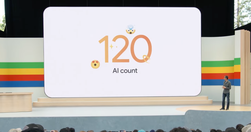Overview: AI Search
created 2024/05/17
What is AI search?
AI search is where search engines like Google preprocess online knowledge to provide a synthesis answer direct on the search results page (they call it "letting Google do the Googling for you").
"the computer from Star Trek: an omnipresent, omniscient digital assistant... [able] to answer questions more or less instantly... Whatever labor funded the production of knowledge that it refers to goes unmentioned, and whatever sources it relies on go uncredited." - Google’s broken link to the web
Google has been doing this for a while, so one could argue that this is nothing new. But it's now promising a step-change in sophistication, and looks reasonably likely to become the default way people get "answers" online... or indeed anywhere.
Why should I care?
This has a number of issues with this. Personally I care a lot about the impact on media business models, but I'm maintaining this Overview because it's directly relevant to my work managing a website for the European Commission.
AI search, in fact, will probably have important implications for the way public organisations manage their online presence. Many of these public websites are structured like icebergs: lots of technocratic knowledge below the waterline for specialists to dive into, with a "synthesis layer" summarising it for non-specialists on top. But what if citizens just go onto Google and get their AI's synthesis there?
Unlike news media, this would not be a problem per se for government organisations ... as long as the AI doesn't misinform the public. But that's a huge assumption. AI is inscrutable: noone, not even Google's own engineers, will really understand what their AI sources when it composes an answer, nor exactly why it writes in the way it did. Users asking about European affairs risk getting answers created by blending everything from EUROPA to the Daily Telegraph to even more unhinged conspiracy nonsense.
As Mike Caulfield points out, while AI search... could be "a good replacement for a step in getting an answer... It’s not a good answer... [because]:
- it’s an answer from nowhere" - is it credible? what are the sources? Noone knows
- it can be unclear
- when the user doesn't do the synthesis, they "miss important things", which is precisely why I do my syntheses myself rather than asking an AI to do it for me (see for example my notes on Mike's post, from which this is taken).
Most users, however, risk taking Google's answer as a good answer. After all, it's a lot less work. And that still assumes that Google is being honest. As Cory Doctorow points out:
"When you trust someone to summarize the truth for you, you become terribly vulnerable to their self-serving lies... the defects in AI give Google a readymade excuse for any apparent self-dealing: "we didn't tell you a lie because someone paid us to ... that was just an AI 'hallucination.'" - Even if you think AI search could be good, it won't be good
As managers of governmental websites we need to adapt to this eventuality, which probably means making some changes to the content we publish, and the online features we offer. My first brainstorm of possible ideas includes:
- doing whatever we can to ensure that AI search answers are accurate, and not bad hallucinations, particularly on politically sensitive topics. Of course, we are not responsible for Google's work, but if there's anything we can do to our content to ensure it is being understood and used properly by the main search engines as they compose AI answers, we should do so - this is basically an updated form of SEO
- figuring out if/how to create online content that complements AI answers
- ensure our websites provide "better than AI" answers
- providing interactivity and a human face to our knowledge
- designing new impact metrics: we will see less traffic, and we won't know whether or how our knowledge is informing the public, so it will be harder to assess the impact of our work.
---
Resources tagged "AI Search"follow:
Relevant resources

"users encountering the company’s AI-generated summaries atop search results found over and over again that Google was hallucinating or worse... suggested putting nontoxic glue in your pizza... putting gasoline in your spaghetti... reported that just 17 American presidents were white ... that people eat one to three rocks per day", co…

A very sceptical take on "Google’s snorefest of an I/O presentation" and the current point in "the latest hype cycle... how exhausting the whole thing has become a year and a half after the release of ChatGPT".The days of being on the inevitable path to AGI because Silicon Valley had "thrown so much capital and compute&quo;…

"Web search ... more like a rummage sale. Your chance of finding an item that addresses your specific issue... is pretty low. You’re not walking into a custom tailor. You’re in the thrift shop... seeing if you can put something together. Some sewing may be required."This, of course, "is mentally taxing", so either they skim, ad…

Doctorow, pointing out that Google's move to AI search "is a tacit admission that Google is no longer a convenient or reliable way to retrieve information, drowning as it is in AI-generated spam, poorly labeled ads, and SEO garbage". Instead, "you'll ask Google a question and an AI will compose an answer based on things it…

"When Sundar Pichai took the stage at Google I/O ... said that the rise of generative artificial intelligence would provide new opportunities... for everyone". While many products unveiled will be doubtless useful, the picture's unclear for search itself: by end 2024 "Search Generative Experience... will appear at the top of re…